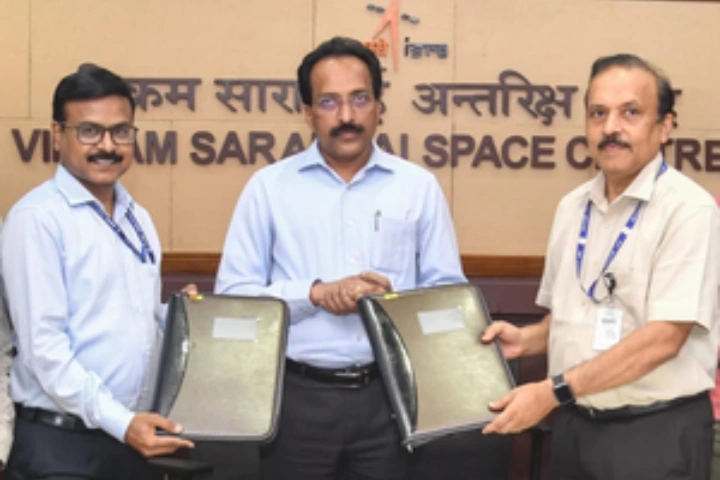

CSIR-NIIST and VSSC join hands for research on new materials for space programme
The CSIR-National Institute for Interdisciplinary Science and Technology (CSIR-NIIST) has entered into a collaborative Memorandum of Understanding (MoU) with the ISRO’s Vikram Sarabhai Space Centre (VSSC) to scale up research and delivery of strategically-advanced materials for India’s space programme.
NIIST Director, Dr C Anandharamakrishnan and VSSC Director, Dr S Unnikrishnan Nair, exchanged the umbrella MoU in this regard recently.
The agreement facilitates VSSC and CSIR-NIIST to identify the broad areas of collaboration, leading to delivery of advanced materials like engineered alloys, coatings and functional materials, which have critical applications in space programmes.
CSIR-NIIST, a premier interdisciplinary research laboratory under the Council of Scientific & Industrial Research (CSIR) has a long record of pioneering work in research and development (R&D) in the area, which would benefit VSSC.
ISRO Chairman, Dr S Somanath, said they believe that manufacturing very high-end materials, electronics, and composites is necessary for India to become completely self-reliant in space research and technology.
“We have been concentrating on doing it within India all the time. For example, the materials we use for our rockets and satellites are reasonably high percentage indigenous,” said Dr Somanath.
“But we are still lacking in high-grade composite and electronics manufacturing. We have to focus on it. If you have to really become a world leader, these areas are very critical. This is the only way to create a real revolution in this domain,” he added.
On completion of Chandrayaan and Aditya-L1 mission, ISRO hopes to develop strategically-important advanced materials and indigenous technologies for a self-reliant India in its forthcoming space projects.
Dr C Anandharamakrishnan said the MoU assured strategic materials for ISRO projects, which are a high priority to NIIST and would deliver engineered components meeting ISRO specifications.
“The areas probably covered are near net shaping and advanced manufacturing, smart coating, H2 gas storage and materials for electronic and magnetic applications,” said Dr C Anandharamakrishnan.
“NIIST has generated state-of-the-art facilities like pilot-scale squeeze casting plants and laser surface machining for undertaking high-quality research and product development. VSSC already supports NIIST for developing cutting-edge technologies like electronic substrates, iridium coatings, carbon fibre composites, and H2 storage vessels,” he added.
Sub Lieutenant Astha Poonia officially became the first woman to be streamed into the fighter…
As Israel awaits Hamas's response on Friday to the latest proposal for a hostage release…
Deputy Chief of Army Staff (Capability Development and Sustenance), Lieutenant General Rahul R Singh, on…
A report on Bangladesh's media landscape has revealed that the restrictive laws and political press…
Prime Minister Narendra Modi has said that India is actively working on creating a comprehensive…
The Indian Chamber of Commerce (ICC) on Thursday hosted the 14th India Minerals and Metals…